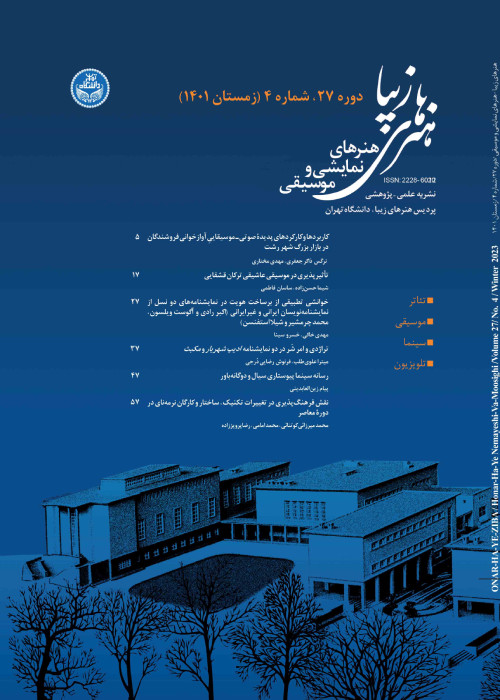An Analysis of Literary and Philosophical Origins in Wagner's Operas
Author(s):
Article Type:
Research/Original Article (دارای رتبه معتبر)
Abstract:
This article aims to examine the philosophical and the literary origins of Wagners operas. The importance of this topic is that Wagners operas are his most prominent musical works, so much so that despite his other compositions, the world of music still knows him with the operas and the achievements that ensued from them. It is recognized among musicologists that Wagners operas are each viewed as a turning point in the evolution of this musical genre. For example, based on the Norse mythology, the Der Ring des Nibelungen, a fifteen-hour-long musical performance, is considered to be the most dramatic work of musical achievement in history, taking Wagner almost twenty five years to complete. Initially, when dealing with the history of the composer it is somehow possible to acknowledge the roots of Wagners interest in dramatic arts. Further to being brought up in a quite artistic environment, he was also a child of an era of political and philosophical transformation, which gives reason to his tumultuous artistic life. Wagner was always influenced by many of these transformations and experienced different and diverse manifestations about life, society, religion, art and so forth. In order to find out why and how Wagner utilized different musical elements, we are bound to study items that have formed the intellectual foundations of this artist. For example, by comparing and contrasting the characters in Wagners operas with the ones in the mythological and epic stories of the world, we can discern the profound and extensive impact of mythology, especially the Norse mythology, on his thought and viewpoint. In general, literature and philosophy are among the most important things such as politics and religion that specifically shaped his perspective and the foundations of his worldview. Essentially, Wagner appraised all artistic materials in order to achieve his conceptual ideals, since he had found out that music alone cannot help him attain his goal, and that is why, besides using elements of music, literature, and philosophy, in their entirety, he also brings in mythology. Likewise, that is what helps us understand his unique musical inventions, such as creating and using leitmotif, singing lines, original harmony, and even the planning and building of a special theater hall for his superfluous opera productions, and how he undertook deconstruction of most of the operatic musical elements in order to reach his intellectual ideals and to portray his philosophical and aesthetic concerns. Bringing these transformations about may have been the reason why he is generally regarded as the greatest composer of the Romantic era and that of all the history of opera. Undoubtedly, in this regard, the role of significant figures, such as Arthur Schopenhauer and Friedrich Wilhelm Nietzsche in philosophy, Christian Johann Heinrich Heine in literature, Johann Sebastian Bach and Ludwig van Beethoven in the realm of music, is undeniable. Using philosophical, literary, and mythological effects, plus modern musical structure, he has tried to portray a new world inspired by old stories, and, in a general sense, a foundation combined from the semantics or logic of mythology in collaboration with synchronic and diachronic perspectives.
Keywords:
Wagner , Opera , Philosophy , Dramatic Literature , Myth
Language:
Persian
Published:
Honar-Ha-Ye-Ziba: Honar-Ha-Ye Mosighi Va Namayeshi, Volume:23 Issue: 57, 2018
Pages:
25 to 34
magiran.com/p1805408
دانلود و مطالعه متن این مقاله با یکی از روشهای زیر امکان پذیر است:
اشتراک شخصی
با عضویت و پرداخت آنلاین حق اشتراک یکساله به مبلغ 1,390,000ريال میتوانید 70 عنوان مطلب دانلود کنید!
اشتراک سازمانی
به کتابخانه دانشگاه یا محل کار خود پیشنهاد کنید تا اشتراک سازمانی این پایگاه را برای دسترسی نامحدود همه کاربران به متن مطالب تهیه نمایند!
توجه!
- حق عضویت دریافتی صرف حمایت از نشریات عضو و نگهداری، تکمیل و توسعه مگیران میشود.
- پرداخت حق اشتراک و دانلود مقالات اجازه بازنشر آن در سایر رسانههای چاپی و دیجیتال را به کاربر نمیدهد.
In order to view content subscription is required
Personal subscription
Subscribe magiran.com for 70 € euros via PayPal and download 70 articles during a year.
Organization subscription
Please contact us to subscribe your university or library for unlimited access!


